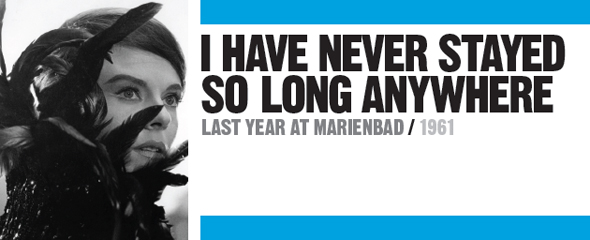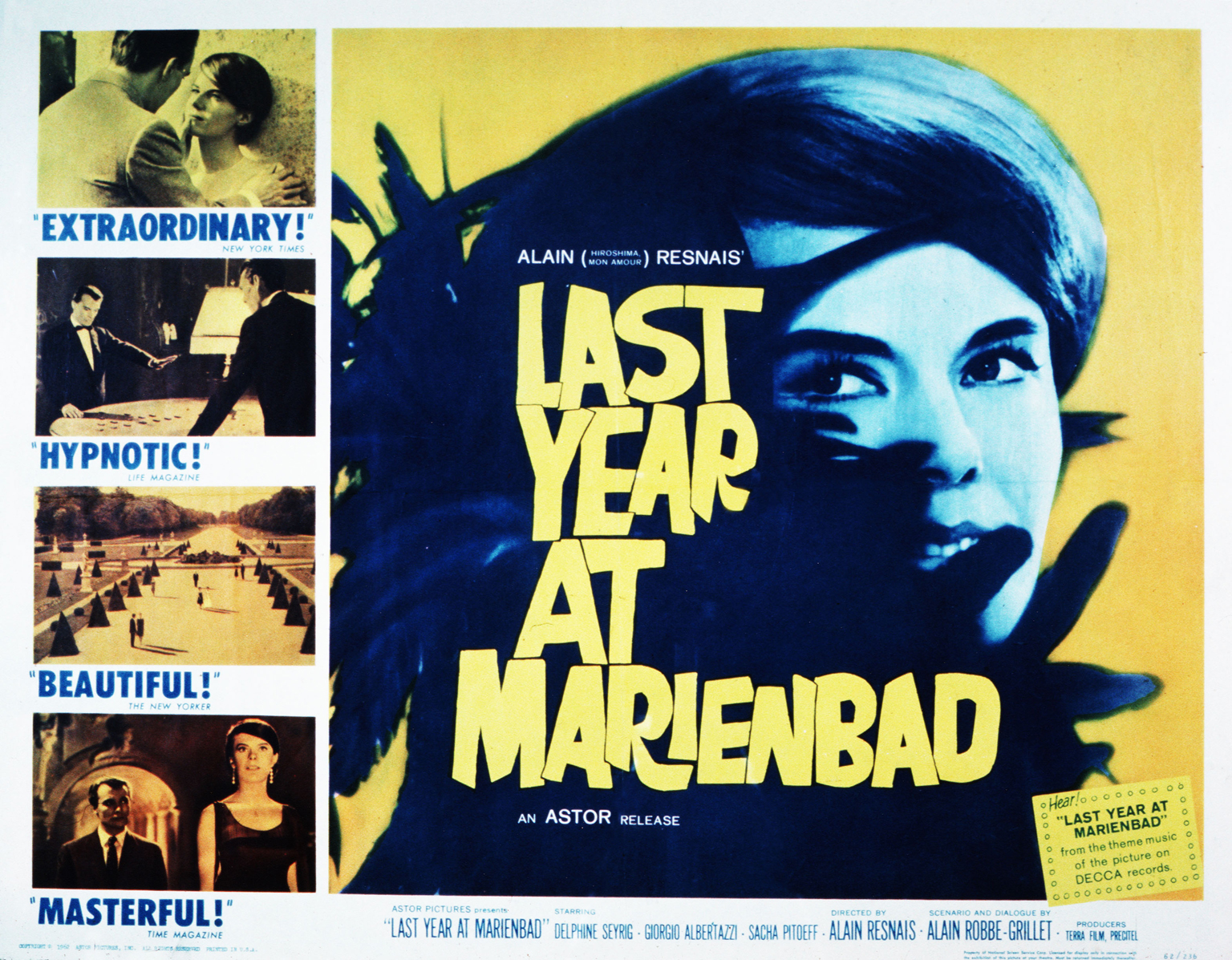The Movie Book (Big Ideas Simply Explained) (2016)


IN CONTEXT
GENRE
Experimental
DIRECTOR
Alan Resnais
WRITER
Alain Robbe-Grillet
STARS
Delphine Seyrig, Giorgio Albertazzi, Sacha Pitoëff
BEFORE
1955 Night and Fog is Resnais’ contemplation of the memory of the Nazi concentration camps.
1959 Hiroshima mon amour, Resnais’ first big success, deals with memory and forgetfulness in the wake of the Hiroshima bomb.
AFTER
1977 Providence, Resnais’ movie about the memories of an aging writer, is hailed in France as a masterpiece but panned by critics in the US.
Beautifully shot in black and white and in widescreen, Alan Resnais’ Last Year at Marienbad has a glacier-paced coolness. Lacking any conventional narrative, it deliberately challenges preconceptions about how movies should work. This approach has influenced a generation of directors, including Stanley Kubrick, David Lynch, and Peter Greenaway.
The movie is set in a palatial hotel in rural central Europe. Here, a handsome stranger known only as X (Giorgio Albertazzi) insists to a beautiful fellow guest, known as A (Delphine Seyrig), that they met and fell in love the previous year in the resort of Marienbad, where she agreed to leave her husband M (Sacha Pitoëff) the following year. A denies his claims, but X persists, in between playing rounds of the mathematical game Nim with M, which M always wins.
For Resnais, the movie was an exploration of time and memory. The script, written by experimental novelist Alain Robbe-Grillet, fuses past and present in a series of surreal, almost nightmarishly repetitive tableaux. Resnais turns these scenes into a dreamlike world in which all is reduced to appearances and games of mirrors. Life goes on in a seemingly ritualistic way, full of allusions and symbols that leave the viewer continually unsettled, unsure whether it’s all in X’s head, or A’s. The movie is a continual interplay of reality and illusion. In one famous scene, shot on an overcast day when the trees cast no shadows, the people arranged elegantly along an avenue all project long shadows across the ground. To achieve this effect, actors’ shadows were painted onto the ground.
“I must have you alive. Alive, as you have already been every evening, for weeks, for months.”
X / Last Year at Marienbad

This famous scene, in which the figures cast shadows but the trees do not, highlights the dreamlike, unreal nature of Last Year at Marienbad, and of much of Resnais’ work generally.
Story of a persuading
Resnais said that the movie’s effects were an attempt to recreate the way the mind works, while Robbe-Grillet insisted that viewers will get lost if they look for a linear narrative. “The whole film, as a matter of fact, is the story of a persuading [une persuasion],” according to Robbe-Grillet. “It deals with a reality which the hero creates out of his own vision.”
There is no sense of time or the story moving forward—the plot, such as it is, is circular and repetitive. The midnight chime that opens the movie is heard again at the end, echoing life’s endless loop of acceptance and rejection, as X is rejected by A, and vice versa. As A says, “I have never stayed so long anywhere.” Famously, Robbe-Grillet has stated that “the entire story of Marienbad happens neither in two years nor in three days, but exactly in one hour and a half”—that is, the time span of the movie.
Last Year at Marienbad has been interpreted in various ways, in terms of Jungian or Freudian psychology, and using poststructuralist analysis, but agreement on the movie’s meaning is rare. Nevertheless, for many critics, it is a high point of the experimental fervor that drove the French New Wave to expand the possibilities and goals of filmmaking in the late 1950s and early 1960s, and it remains influential to this day.

Delphine Seyrig, playing A, was memorably costumed for the role by fashion legend Coco Chanel.
ALAIN RESNAIS Director

Born in Vannes in Brittany in 1922, French filmmaker Alain Resnais continues to divide critics. Later in life he focused more on farce and comedy, but in the first half of his career he worked with leading modern writers such as Alain Robbe-Grillet and Marguerite Duras to create enigmatic and poetic movies about time and memory, which some celebrate as masterpieces and others find pretentious. Resnais died in 2014.
Key movies
1959 Hiroshima mon amour
1961 Last Year at Marienbad
1977 Providence
What else to watch: Un Chien Andalou (1929) ✵ L’Avventura (1960) ✵ La Dolce Vita (1960) ✵ Pierrot le Fou (1965) ✵ The Shining (1980) ✵ The Draughtsman’s Contract (1982) ✵ Open Your Eyes (1997) ✵ Flowers of Shanghai (1998)